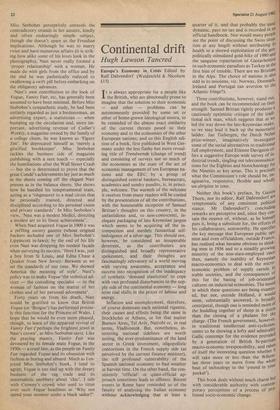Continental drift
Hugh Lawson Tancred
It is always appropriate for a people like the British, who are abnormally prone to imagine that the solution to their economic — and other — problems can be autonomously provided by some set or other of home-grown ideological nostra, to be reminded of the almost exact similarity of the current threats posed to their economy and to the economies of the other European nations; and so this English edi- tion of a book, first published in West Ger- many under the less flashy but more reveal- ing title of Trendwende (change of trend) and consisting of surveys not so much of the economies as the state of the art of economic management of ten European na- tions and the EEC by a group of distinguished central bankers, bureaucrats, academics and sundry pundits, is, in princi- ple, welcome. The warmth of the welcome it receives from many readers will be cooled by the presentation of all the contributions, with the honourable exception of Samuel Brittan's thoughts on this country, in the unfastidious and, to non-conoscenti, in- elegant packaging of late Keynesian jargon which seems to be acquiring all the in- trospection and sterilely fantastical self- indulgence of a silver-age. This should not, however, be considered an insuperable deterrent, as the contributors are distinguished and broadly representative spokesmen, and their thoughts are fascinatingly relevatory of a world moving with varying awareness, acceptance and success into recognition of the inadequacy of synthetic 'demand elasticities' to cope with two profound disturbances to the sup- ply side of the continental economy — long term real shifts in the prices of labour and energy.
Inflation and unemployment, therefore, of course dominate each national vignette, their causes and effects being the same in Stockholm or Athens, or for that matter Buenos Aires, Tel Aviv, Nairobi or, in real terms, Vladivostok. But, nonetheless, in- teresting national sidelines are worth noting, the over-predominance of the land sector in Greek investment, oligopolistic contortions in the French supply side (as perceived by the current finance minister), the still profound vulnerability of the Spanish national economy to bad weather in harvest time. On the other hand, the con- sistently 'official' or quasi-official ap- proach sometimes leads to silliness. Recent events in Rome have reminded us of the fatuity of analysing the Italian economy without acknowledging that at least a
quarter of it, and that probably the most dynamic, pays no tax and is recorded in no official handbook. Nor would many people see the point of discussing the Swiss situa- tion at any length without attributing its health to a shrewd exploitation of the geo- politically stimulated gold-hike of 1980 and the sanguine repatriation of Gastarbeitern to such economic paradises as Turkey at the first hint of trouble. There are no Brixtons in the Alps. The choice of nations is also odd in its missions, viz. Norway, Denmark, Ireland and Portugal (an aversion to the Atlantic fringe?).
Three contributions, however, stand out, and the book can be recommended on their strength. Samuel Brittan rightly produces a cautiously optimistic critique of the tradi- tional sick man, which suggests that as We led the way down the late-Keynesian snake, so we may lead it back up the monetarist ladder. Jan Tinbergen, the Dutch Nobel prize-winner, imaginatively investigates some of the social alternatives to traditional full employment, and Etienne Davignon of- fers a suggestive Europe-wide survey of in- dustrial trends, singling out telecommunica- tions for the Eighties and biotechnology for the Nineties as key areas. This is precisely what the Commission's role should be, WI" aginative, responsive, flexible and whollY un-dirigiste in tone.
Neither this book's preface, by Gaston Thorn, nor its editor, Ralf Dahrendorf are symptomatic of any consistent political stance. Mr Dahrendorf's concluding remarks are perceptive and, since they con- tain the essence of, without, as he himself puts it, being a substitute for, the efforts of his collaborators, noteworthy. He specifies the key message that European public opi- nion and even officialdom, outside France, has realised what became obvious to think- ing men in 1936 and to a steadily growing minority of the non-state-employed since then, namely the inability of Keynesian macro-economics to deal with the micro- economic problem of supply cartels in stable societies, and the consequences of this for the basing of job-orientated cultures on industrial economies. The mood in which these questions are being examin- ed, but not, outside Holland, it would seem, substantially answered, is broadly centripetal, though one is reminded more of the huddling together of sheep in a stool' than the closing of a phalanx for the charge. (The French government, however, in traditional intellectual anti-cyclicisin, seems to be showing a lofty and admirably Gallic contempt for the evidence provided by a generation of British bi-partisan macro-economic irresponsibility, and raises of itself the interesting question whether it will take more or less than the Wilson' ian three years to move from the white heat of technology to the 'pound in your pocket').
This book deals without much charm but with considerable authority with conteM" porary perceptions of a process of Pro- found socio-economic change.


































 Previous page
Previous page